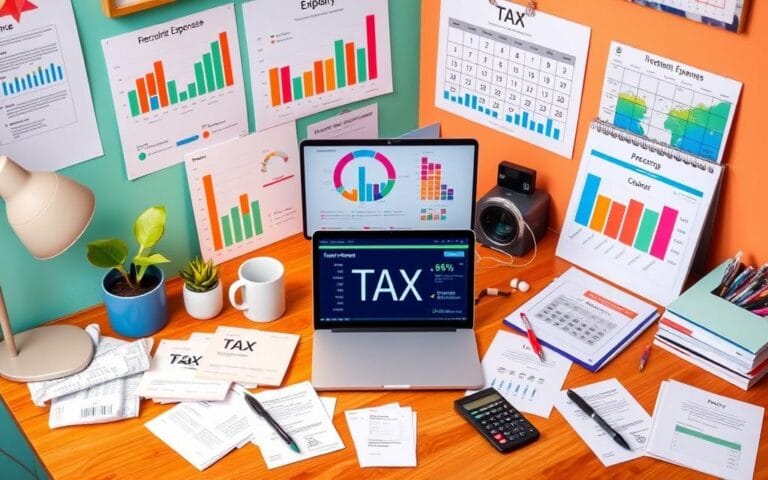adversiment
Choosing the right credit card is key to boosting your credit score. The top credit cards help you build a strong credit history. By using them wisely, you can enjoy better loans and lower rates later.

Understanding Credit Scores
Credit scores are crucial for your financial reputation. Knowing what they mean is key to managing money. A credit score shows how likely you are to pay back debts. It’s a number made by looking at your debt payment habits.
What is a Credit Score?
Credit scores look at several things, like your payment history and how much you owe. Scores go from 300 to 850, with higher scores being better. They mainly focus on how on time your payments are and your credit use.
The Importance of a Good Credit Score
Having a strong credit score does more than just help you borrow money. It can lead to lower interest rates on loans, which saves money. It also influences things like insurance costs and renting homes. Keeping a good score improves your financial status overall.
How Credit Cards Impact Your Credit Score
It’s important to know how credit cards affect your credit score. Many things play into this, like how much of your credit you use, if you pay on time, and the types of credit you have.
Credit Utilization and Credit Score
Your credit utilization ratio measures your used credit against total available credit. Keeping this ratio under 30% is best for a high score. If the ratio is higher, it might look like you’re not managing your finances well.
Keeping an eye on this ratio helps you stay on track.
Payment History and Credit Score
Payment history is crucial for your credit score. Paying on time shows you’re trustworthy. Just one late payment can harm your score.
Always pay on time to keep your score up. This factor plays a big part in your credit evaluation.
Credit Mix and Credit Score
Having different types of credit can boost your score. This includes credit cards, auto loans, and mortgages. It shows you can handle different kinds of credit well.
Lenders like to see a mix, so it’s good to have a balanced credit profile.
| Factor | Impact on Credit Score |
|---|---|
| Credit Utilization Ratio | Below 30% is ideal; higher ratios can hurt your score. |
| Payment History | Most important; on-time payments boost score, late payments lower it. |
| Credit Mix | Diverse accounts can improve creditworthiness. |
Choosing the Right Credit Card for Credit Score Improvement
Choosing the right credit card is key to boosting your credit score. Look at card features, interest rates, and fees carefully. This helps you find the best option. Knowing which features help can make your decision smarter and goal-focused.
Features to Look For
For better credit, consider these features:
- Low Interest Rates: A lower rate saves you money if you have a balance.
- No Annual Fees: Cards without yearly fees mean more savings.
- Rewards Programs: Cards with rewards give cash back or points for spending.
- Credit Reporting: Make sure it reports to all three major bureaus for a score boost.
Interest Rates and Fees
Understanding rates and fees is important for your budget. Avoid high-interest debt, as it can hurt your credit score. Here’s what to look at before choosing:
| Credit Card | Interest Rate (APR) | Annual Fee | Rewards Program |
|---|---|---|---|
| Chase Freedom Flex | 14.99% – 23.74% | $0 | 5% cash back in rotating categories |
| Discover it® Cash Back | 11.99% – 22.99% | $0 | 5% cash back on certain purchases |
| Capital One Quicksilver | 15.49% – 25.49% | $0 | 1.5% cash back on every purchase |
Best Credit Cards for Credit Score
Finding the right credit card is a big step towards improving your credit score. There are various cards for different needs. You can choose from secured credit cards to unsecured ones, and even cards designed for students. Let’s dive into what each type offers.
Secured Credit Cards
Secured credit cards are a great choice if you want to boost your credit score. You’ll need to make a cash deposit which then becomes your credit limit. This makes them a solid option for people with low scores or no credit history at all. Here are some top choices:
- Discover it Secured Credit Card
- OpenSky Secured Visa Credit Card
- Capital One Secured Mastercard
Unsecured Credit Cards for Beginners
Unsecured credit cards are perfect for those new to credit. They don’t require a deposit. Plus, they often have lower interest rates and no annual fees. Here are the best credit cards for beginners:
- Petal 2 Visa Credit Card
- Chase Freedom Student Credit Card
- Capital One QuicksilverOne Cash Rewards Credit Card
Student Credit Cards Options
Student credit cards are designed for young adults stepping into credit. They come with benefits that promote positive credit history and responsible spending. Check out these notable options:
- Discover it Student Cash Back
- Journey Student Rewards from Capital One
- Bank of America Cash Rewards for Students
| Card Type | Features | Best For |
|---|---|---|
| Secured Credit Cards | Deposit required, build or rebuild credit | Rebuilding credit history |
| Unsecured Credit Cards | No deposit, low fees, rewards programs | Credit beginners |
| Student Credit Cards | Rewards, cash back, no or low annual fees | Students managing finances |
Common Myths About Credit Cards and Credit Scores
It’s important to know the truth about credit scores. Many people have wrong ideas about credit cards and their scores. Two big myths are about closing credit cards and applying for many credit options.
Myth: Closing Credit Cards Improves Your Score
Some think that closing credit cards helps their score. But this isn’t true. Closing an account can lower your total credit, which can hurt your utilization ratio. This might drop your score. Closing old accounts can also shorten your credit history, affecting your score.
Myth: Applying for Multiple Cards Hurts Your Score
Many believe applying for several cards is bad for their score. It’s true that applications can cause hard inquiries. But the effect is temporary. If you manage your credit well, these actions won’t harm your score much in the long run.

Using Credit Cards to Build Your Credit
Using credit cards wisely is a great way to improve your credit score. To build a strong credit history, focus on two key actions. First, always pay on time. Second, keep your credit usage low.
Building a Positive Payment History
Making payments on time is crucial for a good credit history. Each timely payment boosts your credit showing you’re responsible. To stay on track, use automated payments or set reminders. This helps avoid late payments, which could hurt your score.
Maintaining Low Credit Utilization
Keeping your credit card balances low is vital. Aim for less than 30% of your credit limit. Doing this shows you’re smart with your credit. It also helps prevent too much debt.
Exploring Authorized User Options
Being added as an authorized user on another person’s credit card can greatly impact your credit journey. It lets you enjoy the main cardholder’s credit history benefits, possibly boosting your credit score. Knowing how this arrangement works is vital for those wanting to build credit.
How Being an Authorized User Works
As an authorized user, you get a card linked to the main account holder’s credit line. Their payment practices and credit use appear on your credit report. This method works well for people starting to build credit, especially if the cardholder has good financial habits.
Benefits of Authorized User Credit Cards for Credit Score
Being an authorized user comes with several advantages:
- Improved credit score: Positive payment history from the main account holder can lift your credit score.
- Access to credit utilization: Sharing a card with low utilization can help improve your utilization rates.
- Opportunities for financial education: It offers a chance to learn about smart credit card use.
- Less risk compared to traditional credit cards: You aren’t responsible for payments, reducing your financial risk.
Monitoring Your Credit Score
Keeping an eye on your credit score is key to having good credit health. Checking your credit report regularly helps you see where you need to improve and confirm its accuracy. There are many tools out there to help you keep track of your credit score changes. They give you the info to make smart financial choices.
Using Credit Monitoring Tools
Using credit monitoring tools keeps you in the loop about your credit status. Some services are free, while others with a fee give more insights. They typically offer:
- Real-time alerts about credit score changes
- Updates on new inquiries and account changes
- Access to credit reports from major bureaus
Monitoring regularly protects against identity theft and helps maintain a good credit score. Selecting the best tool depends on what you prefer and how detailed you want the monitoring to be.
Understanding Credit Reports
Knowing how to read credit reports is crucial for keeping your credit report accurate. These reports detail your credit history, like payment history, credit inquiries, and account status. Going over these reports helps find any mistakes that could affect your score.
Finding mistakes means you need to report them quickly. Experian, TransUnion, and Equifax allow you to file claims. Knowing your report well helps you fix problems that are lowering your credit score.
Strategies for Improving Your Credit Score with Credit Cards
Getting a better credit score takes planned actions. Using credit cards smartly is key. They help you spend wisely and make it simpler to have a strong credit score.
Responsible Spending Practices
It’s essential to spend money wisely with credit cards. Sticking to a budget stops you from spending too much. Here are some tips for keeping your spending in check:
- Set a monthly budget to control your expenses.
- Think before you buy something on a whim. Ask yourself if you really need it.
- Only use credit cards for important buys. Always pay off what you owe quickly.
- Check your spending habits regularly. Make sure they match your financial goals.
Regularly Checking Your Credit Report
Checking your credit reports often is also vital. It helps you keep an eye on your finances. You can spot mistakes early. Here’s why checking your credit report is good:
- Find mistakes that could hurt your credit score.
- Keep track of how much credit you’re using. Change your spending if you need to.
- Learn what affects your credit score. This knowledge lets you make smart choices.
- Be on the lookout for new accounts that you didn’t open. They could mean someone stole your identity.
With these tactics, like careful spending and checking your credit reports, you’re on your way to a better credit score. This improves your money health and credit standing.
Conclusion
Credit cards are key in building and boosting credit scores. Knowing what affects your credit score helps make smart choices. It’s vital to use credit cards wisely, paying on time and not maxing them out. These steps are crucial for improving your credit.
This article shared tips on raising your credit score with credit cards. Whether you choose secured or unsecured cards, or become an authorized user, many options exist. Keeping an eye on your credit report and spending wisely are important too.
Think about your journey to a strong credit profile as an ongoing one. With careful management and learning about credit, you can really improve your financial future.
FAQ
How do credit cards affect my credit score?
Credit cards can change your credit score in several ways. Payment history, how much of your credit you use, and the types of credit you have matter. If you use credit cards wisely, like paying bills on time and not maxing them out, your score can go up.
What is credit utilization and why is it important?
Credit utilization is about how much of your credit limit you’re using. It’s a big deal for your credit score, making up about 30% of it. Experts suggest keeping your usage below 30% to keep your credit score healthy.
Does payment history really affect my credit score?
Yes, your payment history is super important and makes up about 35% of your score. Paying on time every time is key to a strong credit score.
What is a good credit mix?
A healthy credit mix includes different types of accounts, like credit cards, car loans, and store accounts. This mix can boost your score by showing you can handle various kinds of credit well.
How does the age of my credit cards impact my credit score?
The age of your credit matters too. Older accounts can help your score because they show a long history of managing credit. It’s smart to keep your oldest accounts open.
Can I improve my credit score by becoming an authorized user?
Yes, being an authorized user on someone else’s card can help. If the main user pays on time and doesn’t use too much credit, it can make your credit better. But you’re not on the hook for the bills.
What happens to my credit score if I close a credit card?
Shutting a credit card can hurt your credit score. It might up your credit use rate and lower your account age average. So, it’s often wiser to just keep the card open.
What are some strategies for improving my credit score with credit cards?
Using credit cards smartly is key. Keep your balance low and always pay on time. Checking your credit report often for mistakes helps too.
Good spending habits go a long way in boosting your score.
Do credit card fees affect my credit score?
Directly, fees don’t affect your score. But, hefty fees can lead to missed payments or more debt, damaging your score. Watch out for cards with big fees.
How often should I check my credit report?
You should look at your credit report at least once a year. It helps catch mistakes and lets you know where you stand. Keeping up with your credit report is crucial for managing your score well.


